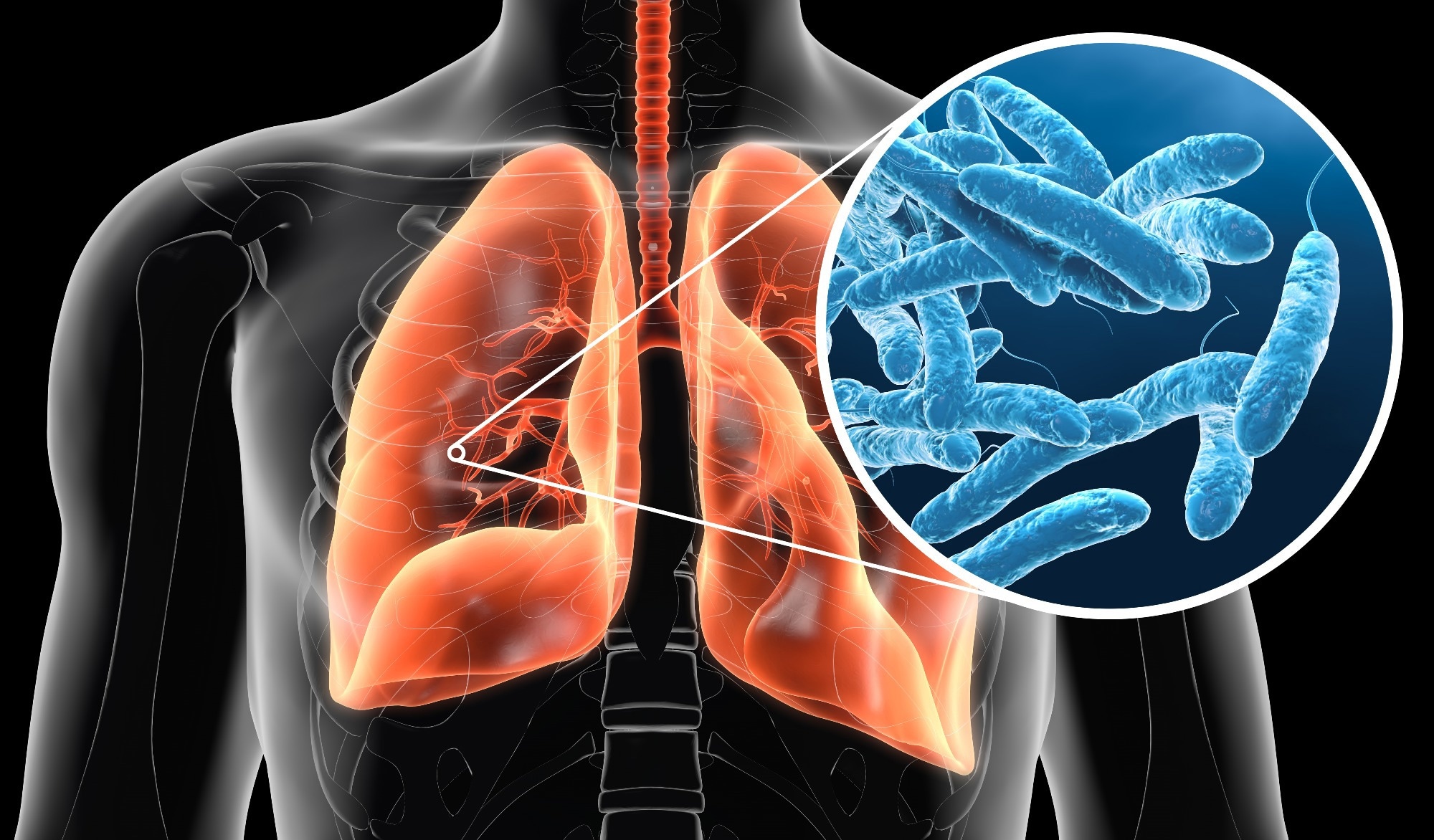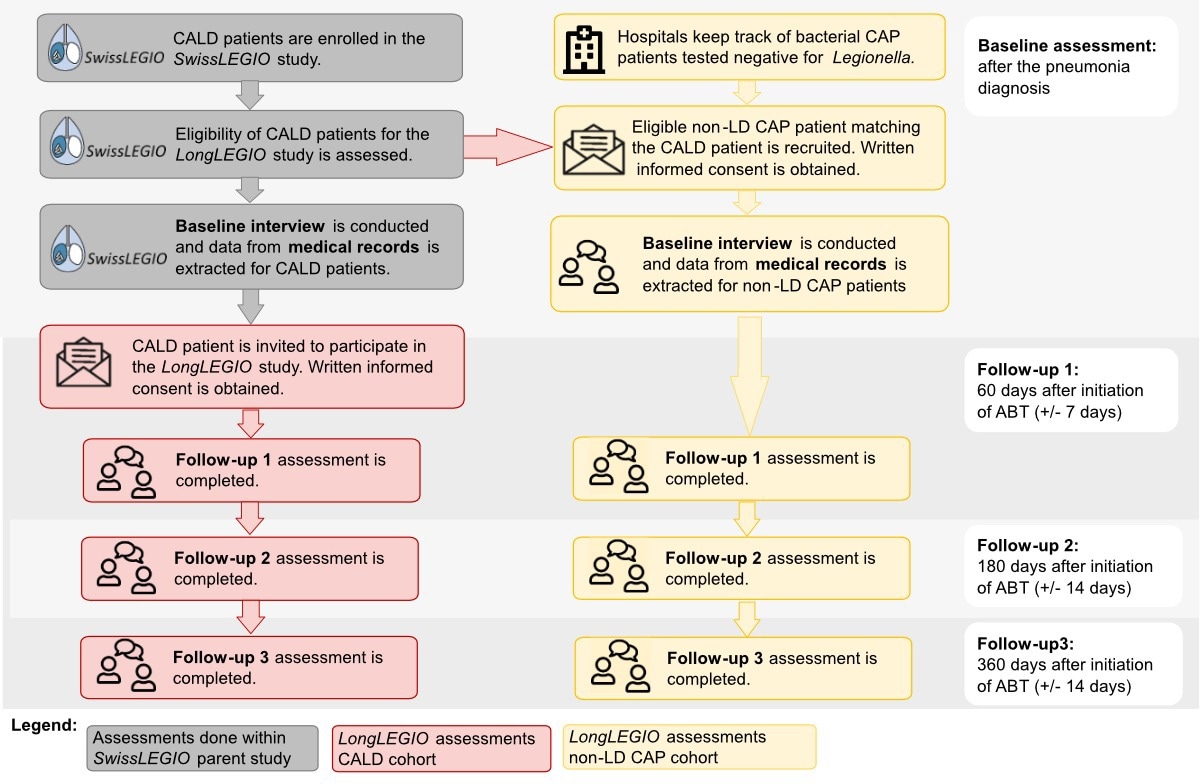Can Legionnaires’ disease trigger long-term symptoms? Discover how Swiss scientists are following pneumonia survivors to uncover the real impact on health and wellbeing.
 Study: Long-term impacts of Legionnaires’ disease on health and wellbeing: rationale, study design and baseline findings of a matched cohort study (LongLEGIO). Image Credit: Axel_Kock / Shutterstock
Study: Long-term impacts of Legionnaires’ disease on health and wellbeing: rationale, study design and baseline findings of a matched cohort study (LongLEGIO). Image Credit: Axel_Kock / Shutterstock
In a prospective methodology report published in Swiss Medical Weekly, researchers propose to leverage data from the LongLEGIO Swiss cohort (119 individuals, 38.7% female) to evaluate the long-term (chronic) aftermath of severe bacterial (pneumonia and pneumonia-like) infections.
The study will prospectively monitor cases for a year and compare them to patients with Legionella test-negative bacterial community-acquired pneumonia (CAP) to determine if Legionella bacteria might be uniquely associated with post-acute infection syndromes (like "Long COVID"). Baseline data from 59 cases and 60 comparison patients already highlight key differences between these groups, setting the stage for crucial insights into the actual burden of this disease and informing future research and public health policy.
Background
Pneumonia remains a leading cause of human morbidity and mortality, contributing to approximately 120 million cases and 1.3 million deaths annually. While children and older adults are most vulnerable to pneumonia-associated mortality, a growing body of heterogeneous evidence suggests that even survivors of some pneumonia strains suffer post-acute infection-like symptoms that extend long beyond their hospital discharge.
Acute pneumonia survivors increasingly report persistent symptoms like fatigue, cognitive impairment ("brain fog"), and reduced quality of life that extend for weeks or even months after infection recovery. This condition, termed post-acute infection syndrome, is by no means a novel discovery but has gained substantial traction and renewed scientific attention in the wake of the COVID-19 pandemic and its "Long COVID" aftermath.
Unfortunately, medicine has not yet established whether pneumonias cause distinct post-acute infection syndromes, nor have any links between specific microbes and potential long-term outcomes been systematically investigated.
Legionnaires' disease is a severe form of pneumonia caused by Legionella bacteria, with symptoms commonly including severe respiratory illness and significant extrapulmonary symptoms like confusion and kidney damage. Recent limited evidence suggests that Legionella bacteria might trigger a more profound and lasting syndrome, similar to the well-documented post-Q fever fatigue syndrome. However, whether these symptoms are lasting effects of the severe infection or reflect a distinct condition caused by Legionella remains unknown.
About the Study
To address this knowledge gap, researchers in Switzerland designed the first comparative, prospective matched cohort study to systematically compare Legionnaires' disease's long-term health impacts with other forms of bacterial community-acquired pneumonia.
The study recruited (June 2023 to June 2024) 59 patients with confirmed Legionnaires' disease and 60 patients with Legionella test-negative bacterial CAP. To ensure a fair comparison, the latter group was carefully matched to the Legionnaires' patients across several demographic and medical parameters, including sex, age, hospital type, and date of diagnosis. The study fell short of its original target of 80 patients per group (due to recruitment constraints), limiting statistical power.
Data collection is ongoing and comprises a series of structured, questionnaire-based interviews at four key time points: baseline (during the acute illness; completed) and at 2, 6, and 12 months following the start of antibiotic treatment. Researchers note that potential recall bias may affect longer-term symptom reporting. These questionnaires assess several patient-reported outcome measures (PROMs), capturing data often missed in standard medical records.
Specifically, the interviews measure:
- Health-Related Quality of Life (HRQoL)
- Fatigue
- Healthcare utilization
- Persistent symptoms

Recruitment, enrolment, and data collection for the community-acquired Legionnaires’ disease (CALD) and Legionella test-negative bacterial community-acquired pneumonia (non-LD CAP) cohorts. Grey: Baseline interviews and data extraction from electronic medical records for CALD patients were done within the context of the SwissLEGIO parent study. Red: LongLEGIO recruitment and data collection for the CALD cohort. Patients were recruited two months after the acute infection from a pool of CALD patients previously included in the SwissLEGIO parent study. Yellow: LongLEGIO recruitment and data collection for the non-LD CAP cohort. Non-LD CAP patients were enrolled from four universities and cantonal/regional hospitals shortly after the pneumonia diagnosis. ABT: appropriate antibiotic therapy; CAP: community-acquired pneumonia; LD: Legionnaires’ disease.
Baseline Study Findings
The baseline study characteristics and data of the 119 enrolled patients already reveal initial differences between the two groups. While both cohorts had a median age of 69 years and were predominantly male, they differed significantly in their comorbidity profiles. Patients with Legionella test-negative CAP demonstrated a higher prevalence of chronic obstructive pulmonary disease (COPD) (20.0% vs. 11.9%), malignancies (33.3% vs. 13.6%), and immunosuppression (25.0% vs. 13.6%), explaining their lower pre-illness quality of life scores.
Conversely, Legionnaires' disease patients displayed a higher rate of chronic kidney failure (15.3% vs. 10.0%). Moreover, patients with Legionnaires' disease were more likely to report extrapulmonary symptoms like muscle aches (51.8% vs. 25.9%) and fever (89.3% vs. 76.3%) than their comparison group, and also had a higher rate of ICU admission (13.6% vs. 8.3%).
When asked to rate their quality of life in the month before their illness, the non-Legionnaires' CAP patients reported significantly lower baseline scores (median EQ-VAS score of 70 vs. 85), likely reflecting their greater comorbidity burden. A key limitation is that 73% of these patients had no pathogen detected despite a bacterial pneumonia diagnosis.
Conclusions
The present LongLEGIO study will provide the first high-quality, comparative evidence on the long-term health consequences of Legionnaires' disease and expand our understanding of long-term pneumonia pathophysiology. By meticulously tracking patients over a year and comparing them to a well-matched patient group, the study will help determine whether a specific post-Legionnaires' syndrome distinct from general pneumonia sequelae exists.
This research is crucial for several reasons. It will contribute to a more holistic understanding of pneumonia's full disease burden, which is currently underestimated due to a disproportionate focus only on the acute phase. Furthermore, the findings will provide vital data to help clinicians and public health officials better anticipate the long-term care needs of survivors, potentially leading to improved follow-up protocols and a more accurate picture of what recovery truly entails.
Journal reference:
- Bigler, M., Vaucher, M., Wiederkehr, M., Brülisauer, S., Albrich, W. C., Dräger, S., Gisler, V., Akers, I., & Mäusezahl, D. (2025). Long-term impacts of Legionnaires' disease on health and wellbeing: rationale, study design and baseline findings of a matched cohort study (LongLEGIO). Swiss Medical Weekly, 155(6), 4333. DOI: 10.57187/s.4333. https://smw.ch/index.php/smw/article/view/4333/6266